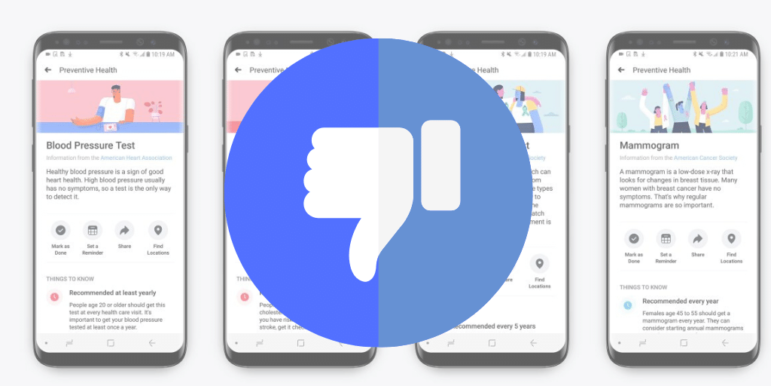When Facebook announced that they were launching a new “preventive health” tool, some users were understandably concerned about data privacy. There are a lot of reasons to distrust Facebook, from misinformation in political ads, to unauthorized sharing of personal user information.
But privacy isn’t the only thing we should be worried about with this new tool—there is also good chance that it will lead to overdiagnosis and overtreatment.
Facebook’s tool gives users health recommendations based on their gender and age. Some of these recommendations are widely accepted and have been shown to save lives, such as annual blood pressure tests and screening for cervical cancer every five years.
However, some of their recommendations are not so cut-and-dry. For example, the Facebook tool advises women age 45 to 55 to get a mammogram every year. While the American Cancer Society recommends this, other groups, such as the US Preventive Services Task Force, recommend biennial screening (every two years) for women age 50-74, acknowledging that screening for women younger than 50 has a much greater risk of harm than benefit. If all women follow Facebook’s advice, there will be many more false positives and biopsies, with no overall survival benefit.
Facebook’s advice on cholesterol screening is slightly misleading as well. They recommend, as does the American Heart Association, that people over 20 get cholesterol tests every 4-6 years. However, a study in the Annals of Internal Medicine found that women younger than 50 and men younger than 40 years without other risk factors have very low risk of cardiovascular disease, and thus may not benefit from regular cholesterol screening. The USPSTF similarly finds little evidence that men younger than 35 and women younger than 45 at low risk of CVD would benefit from cholesterol tests, so they do not offer a recommendation.
To create this tool, Facebook collaborated with the American Cancer Society, the American College of Cardiology, the American Heart Association, and the U.S. Centers for Disease Control and Prevention—but not the USPSTF, Choosing Wisely, or other professional groups that are concerned with overdiagnosis and overtreatment.
Users should be wary of the new Facebook tool, not only because of the potential for health data misuse, but also about the potential for physical and financial harm from overscreening.
